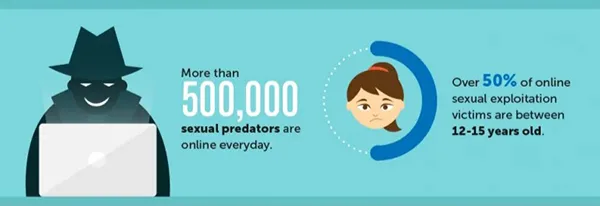Understanding Online Predators and How to Stay Safe
With the world moving into a digital space, modern teens and children have become pretty tech-savvy, some even more than adults.
But with so many ways for kids to communicate over the Internet, the dangers of online predators rise.
A recent report states that more than 10% of teens have become victims of predatory behavior of some kind.
Over the last few years, the tactics of these predators have changed and become even more complicated.
These people use different tactics, like pretending to be friends, manipulating, or blackmailing, to get to children online.
But still, there are ways to protect our children from being exposed to such dangers.
In this article, we will get to know what an online predator is, how they operate, and how you can protect your kids from them.
What is an Online Predator?
Online predators are the creepy people lurking on the dark side of the internet.
These predators use communication methods to get in touch with children and try to exploit, manipulate, or blackmail them into sexual or violent conversations and relationships.
Just think of it as a form of harassment that is used against kids and teens.
Online predators tend to sexualize the relationship, use child grooming, encourage the sharing of personal pictures or videos, and initiate bullying or threats.
DID YOU KNOW?
Children are more vulnerable to online predators as they rely more on the Internet for learning and socializing. 53% of kids gave strangers their phone numbers, while 11% met strangers.
Communication Methods of Online Predators
Online predators use many different ways to connect with kids online.
And they are not always the “scary” strangers we usually imagine and can pretend to be friends first to gain your trust.
This is one of the dangers of these people, as spotting them before it is too late can be pretty tricky.
Here are some of the most common communication tools they use:
- Social Networks. Predators can use these websites to view kids’ pictures and videos and collect other personal details. They can also create fake accounts and pretend to be children to start conversations, gain trust, and potentially engage in sexual activities.
- Email Messages. Predators can collect and use the email addresses of minors to send unsolicited or pornographic content.
- Chat Rooms. In chats, these people can pretend to be friends with the same hobbies and interests and actively communicate on common subjects. Once a close connection is established, they can bring up sexual conversations or offer to meet personally.
- Grooming Process. During online chats, predators try to create close relationships with victims and their relatives. The goal here is to create trust, become friends, and gradually engage in sexual activities.
- Online Games. It is quite easy to connect with kids through online games. Predators can communicate through game chats, share rare game inventory items, or send gift cards to become friends. Linking through in-game chats as an imaginary character makes gaining trust and staying incognito easy.
Stay Safe From Dangers of Online Predators
Many people hide their identities online, and you never know when you might encounter a pr edator.
But that doesn’t mean you should always be scared to connect online or avoid using the Internet.
There are multiple different ways to mitigate the dangers of online predators.
So make sure to use the following tips and tricks to stay safe.
Make Social Media Profiles Private
Social media websites have different security and privacy settings, but generally, all of them have some way to limit who can see your profile.
Always set your profile as private so only friends or followers can see your posts and pictures.
Managing who can send you direct messages and add comments to your posts is also a good idea.
Keep Personal Information to Yourself
Don’t use any of your personal information, like your full name, phone number, or address, online.
It’s the same for your interests and hobbies too, online predators can use this info to get close to you.
And it is also a good idea to use made-up nicknames instead of real names when creating profiles on social media or characters in games.
Secure Your Device
Keeping your device secure from viruses and malware is also important.
The danger of online predators comes in many forms, and if they know any sensitive information about you, they can use it to hack into your phone to control or track you.
Do you ever wonder if there is spyware on your phone?
The only way to find out is by running an antivirus scan, checking installed apps, and viewing your Internet usage.
Don’t Share Your Passwords
Not sharing your online passwords might seem like one of the most basic but children can oftentimes be coaxed into sharing them online.
You should teach your children to never give their passwords to anyone, not even to friends.
If someone knows your password, they can use it to control your account and see your private conversations.
Beware of Strangers Online
The Internet seems like a great place to meet new people and find someone with the same interests.
But people online are not always who they say they are.
So, you should be wary of strangers and random online interactions.
You can always block unknown users if someone is too persistent in reaching you, but you need to avoid talking to them in the first place.

More than 500,000 sexual predators are online every day and over 50% of online sexual exploitation victims are between the age of 12-15 years old.
In Conclusion
When talking to strangers online, it might be hard to notice warning signs or red flags.
They can pretend to be your friends and gain your trust before they move on to any unsolicited activities or start conversations of sexual character.
The danger of online predators should not be underestimated.
However, following common security practices like keeping your profiles private and not sharing your personal information or passwords plays a huge role in staying safe online.
Share
















